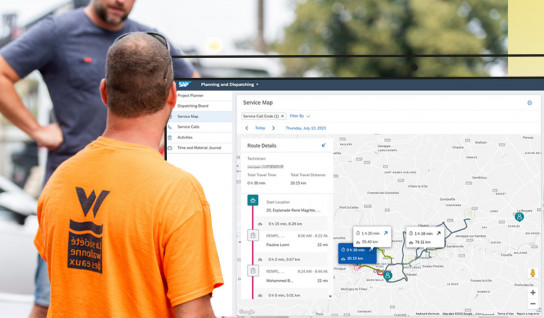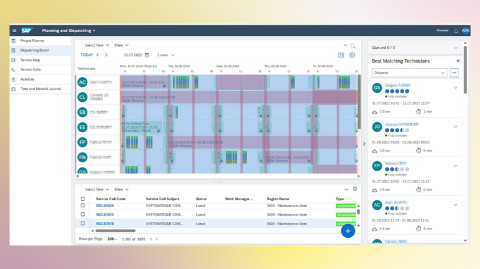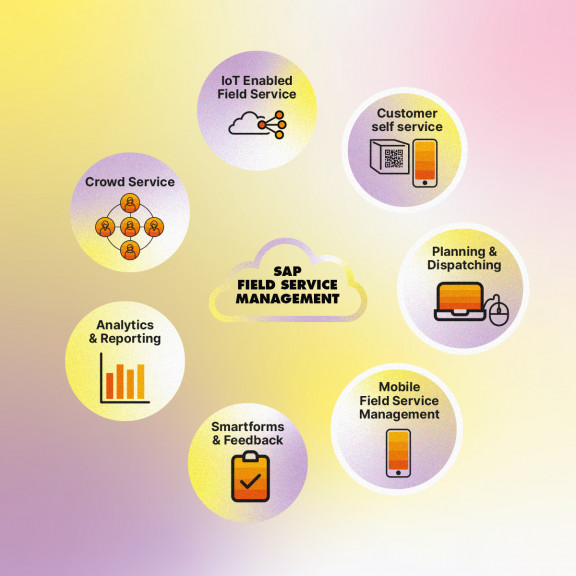
SWDE
Optimizing SWDE’s customer service with FSM
Imagine being a customer support employee who is flooded by calls from customers with questions about support, or even worse, an emergency because there is a leak. Sounded familiar for our client SWDE, which is why they opted for an FSM solution to automate and optimise their workflows, so organisation stress can be reduced for their customer support services, and their technicians. Learn how they did this with the help of SQLI Belgium.

When SWDE met FSM
Let’s get the abbreviations out of the way first: SWDE is the Walloon Agency for water distribution (Société Wallonne Des Eaux), and they were looking for an efficient solution to help with their technical support. Enter SAP’s Field Service Management software (FSM), proposed by our experts.
This means that every service is able to focus, and your company benefits from:
1. Qualitative planning for short- and mid-term
- Logistic and financial planning of your resources
- Shared responsibilities between services
- Transparency and reliability for field technicians
- Route optimization
- Skill management
2. Enhance customer satisfaction
- Visibility and communication
- Customer self-service web portal
3. Increased call center focus
- Drag-and-drop method
- Responsiveness in case of emergencies
Project approach – Let's get integrating
At the time of writing SQLI concluded phase 1 of the FSM integration which consisted of launching the application for the customer database, including the new web portal and the current external mobile solution.
At SQLI we prefer a fit-gap methodology, so we can do a cost-effective integration of the standard FSM solution. This reduces extra analyses and costs for our client, but as with all of our integrations of the SAP-systems, extra modules can always be discussed.
Who did we need to complete this process?
The list is fairly short, and includes personnel from our client’s side, their integrations, and SQLI:
- SQLI project manager
- SQLI SAP expert in S/4 and Proaxia
- Client Proaxia contact
- Client representatives for
- Planned maintenance & Customer Services, as they are the primary users of the system.
- HR, because they need to use the system too to add and update personnel, their skillset and holidays.
Let it go – Our FSM workflow
Before starting the projects, our team made an assessment of the possible risks of the integration:
- Request volume: up to 1000 order per day, a clear and efficient structure is essential
- The number of different components that needed to be integrated as well:
- CRM
- FSM & customer related systems
- Mobile solution, which was developed by another software company
- S/4 Hana
- New website that was being launched during the run of the project
To make sure our client is involved within the integration process, we foresee an extensive blueprint phase, with inclusive workshops regarding the system that is about to be installed: our client’s employees do not only get a hands-on training and examples of the system, but also early access to it, so they can get used to the interface and functionalities. This makes the integration more tangible, and who doesn’t love some training wheels when trying out something for the first time? An added bonus of this type of training is that the integration itself will run more smoothly as the team will be able to focus on technical issues and less on user issues.

As there were numerous components to the roll-out of the system, some of which are not a part of the available FSM modules SAP provides, we checked and doublechecked during the integration process; with our client, but also with contact people from the various integrations. This way everything was tested thoroughly before going live with the project.
The project is now in the support phase, which means we are assisting our client as new support packs are being released for their FSM implementation, and for Proaxia too. This way we can guarantee corrective and evolutive maintenance is done by a trusted partner who has extensive experience and knowledge of the different systems.
Of course, we would be amiss not to share our learnings too, as we move into the next collaboration with SWDE. We benefitted from
- The extensive blueprint phase at the start of the project
- The key user involvement and various demo sessions, saving us time and resources during the implementation phase
- Our successful collaboration with Proaxia
- Extensive testing and anticipation of the other system’s updates so we had no surprises when going live as the integration pivoted as needed during the development phase based on the changes in the external systems.
The FSM planning tool, deployed in partnership with SQLI for our technical services, perfectly aligns with our organization. It's stable, reliable, and available at our 1.2 million customer sites. With SQLI's support, we enhanced the solution to meet user needs. Combined with our e-services and CRM, it improves our customers’ experience when they need our services.
An eye to the future
After successfully concluding phase 1, we are now preparing for future integrations in phase 2 like a new mobile app, and crowd management functionalities. The latter will allow our client to efficiently manage external contractors, effectively increasing the support capacity and, in theory, faster response times, which can only increase customer satisfaction.
If you are considering improving your customer service, whilst reducing your overhead costs, our experts are happy to put the flow back into your workflow. Fill out the form below, and we’ll be happy to contact you.

